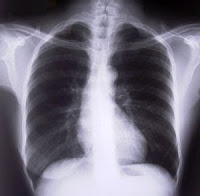The latest phase of the NHS ‘Be Clear on Cancer’ campaign kicked off
yesterday in an attempt to promote awareness of the common signs and
symptoms of lung cancer so that people can seek medical assistance at an
early enough stage to receive appropriate treatment and lessen the risk
of dying from the disease.
Lung cancer has the unwanted title of being England’s biggest cancer
killer, claiming around 28,000 lives each year from approximately 33,800
people that are diagnosed with the deadly disease.
The campaign will be primarily targeted
at those over the age of 50 as they are the group who are most
vulnerable and at risk. Almost a fifth (19%) of over-50s admit they have
not previously been to see their doctor when suffering with a
persistent cough as they assumed it would go away by itself eventually
and not anything serious.
The campaign will involve TV advertisements showing real-life
doctors, in addition to print and radio lasting until the middle of
August. In several shopping centres there will also be face-to-face
events taking place.
One important message from the new campaign is: If you are suffering
from a cough that is still prominent after three weeks then go to see
your doctor immediately and no not simply disregard your symptoms.
Health chiefs want to make more people aware of this because of the
fact that each year around 24,000 people across England are diagnosed
with lung cancer when the disease has progressed to a late stage.
Unfortunately, only 15% of cases are caught at an early enough stage
whereby treatment is likely to prove successful.
Reasons behind the failure in getting help at an early stage for
treatment may be linked to a widespread lack of knowledge about lung
cancer and the early signs and symptoms of it. In fact, the latest
figures – extracted from an omnibus survey conducted with a
representative sample of 1,045 adults aged 16 and above in England
between 7 and 10 June 2013 by TNS England BMRB – show that nearly
three-quarters (73%) of people do not realise that lung cancer is
England’s biggest cancer killer. Moreover, 40% of people are unaware a
cough lasting three weeks or more could be a sign of lung cancer.
However, there are other symptoms to be aware of in regards to lung cancer, such as:
. Coughing up blood.
. A long-standing cough that gradually gets worse.
. Persistent breathlessness.
. Persistent chest infections such as bronchitis or pneumonia.
. Inexplicable weight loss.
. Aching/pain in your chest and/or shoulder area.
Although smoking
causes an estimated 85% – 90% of all lung cancer cases, non-smokers can
still develop the disease so if you do not smoke and still show signs
of the above symptoms, do not assume you cannot possibly have lung
cancer as you don’t smoke. Although the fact remains that smokers are
still 15 times more likely to die from the disease compared to those who
have never smoked.
Health Secretary Jeremy Hunt spoke about the importance of spotting
lung cancer as early as possible, saying: “More people die from lung
cancer than any other cancer in England, but many people don’t know the
signs and symptoms that could save their lives. The message from this
campaign is clear – if you have a persistent cough, go and see your
doctor. The earlier lung cancer is diagnosed, the more likely that
treatment will be successful. I am committed to improving cancer
survival rates and have set out an ambition to save an extra 5,000 lives
every year by 2014 – getting people diagnosed early is one part of our
drive to have the best cancer services in the world.”
Sean Duffy, national clinical director for cancer at NHS England,
added: “Awareness campaigns like this are especially important in
getting people with potential symptoms into doctors’ surgeries. During
the regional pilot, trusts within the campaign area saw a 14% increase
in lung cancer cases diagnosed compared with a year earlier, whereas
there was only a 4.7% increase in trusts outside the pilot area.
However, more needs to be done for our survival rates to be as good as
the best in Europe. If they were, it is estimated that around 1,300
deaths could be avoided each year.”


No comments:
Post a Comment